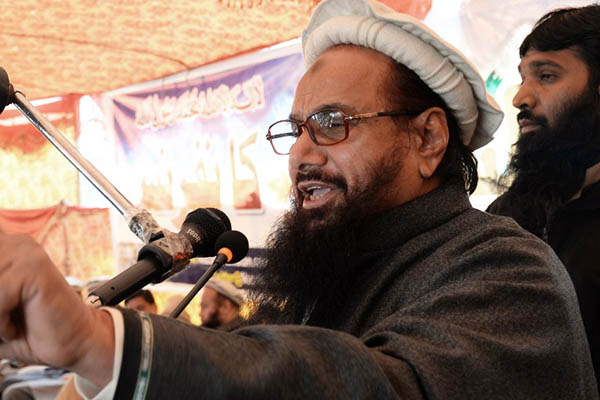
Hafiz Saeed. Sajjad Qayyum—AFP
The real problem is Pakistan’s notoriously plodding judiciary.
Jamat-ud-Dawah, the charity organization set up by Lashkar-e-Taiba founder Hafiz Saeed, has been running its dispute-resolution centers (or “Shariah courts,” as the national press calls them) for a long time. The News in its Saturday edition quotes a Dawah arbitrator as claiming that the Lahore center alone had speedily resolved 5,529 cases (including murder, through payment in camels) by November. The centers in Bahawalpur, Gujranwala, Islamabad, Karachi, Multan, and Quetta are also operating under a literalist, purist interpretation of the Quran.
Saeed, who has a $10-million bounty on his head and is accused of involvement in the 2008 Mumbai attacks, is the appellant authority and last word here. Dawah maintains that these centers are not courts, and that the organization and its members respect Pakistan’s mainstream, creaky judicial system. But The News has exploded the myth of “arbitration” at these centers. Arbitration proceedings under law require the consent of all parties to the dispute. According to news reports, the Dawah centers are court-like because they serve summons, enforced through their own manpower, on often reluctant respondents. Dawah denies this. How do the orders of these centers get implemented? Are the centers running their own prisons too? These questions remain unanswered for now.
Will the state of Pakistan, with its dissolving writ, move to action against Dawah for undermining the Constitution?
The reality is that Dawah is a powerful force in Pakistan, particularly in the Punjab and Pakistan-administered Kashmir. It runs scores of schools and colleges, and is usually the first responder in disaster-hit areas. It is well funded, well feared, and even well liked among many segments of society despite its baggage. Pakistan’s ill-protected judges and craven politicians do not have it in them to strike down the Dawah dispute centers.
The Urdu-language press has been tamer in its criticism of this parallel justice system. The Punjab government has also been compelled to speak in two voices. One minister dismissed the hullaballoo by saying these centers are reconciliation institutions while the law minister, Rana Sanaullah, said the matter would be investigated. On Friday night, Saeed tried to cool down the controversy by announcing he would close down his the centers. But that sounds like a yarn.
The real problem is an old problem: people are desperately unhappy with Pakistan’s criminally plodding courts. This is obvious from the seeming popularity of the Dawah centers. And since there are no quick fixes here, the Dawah centers, perhaps closed today, can only prosper.
